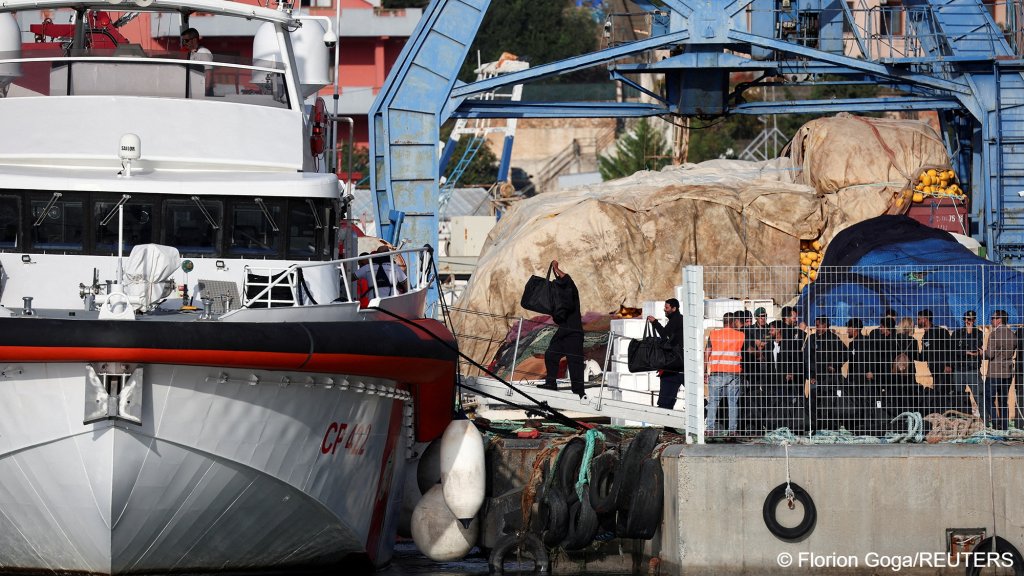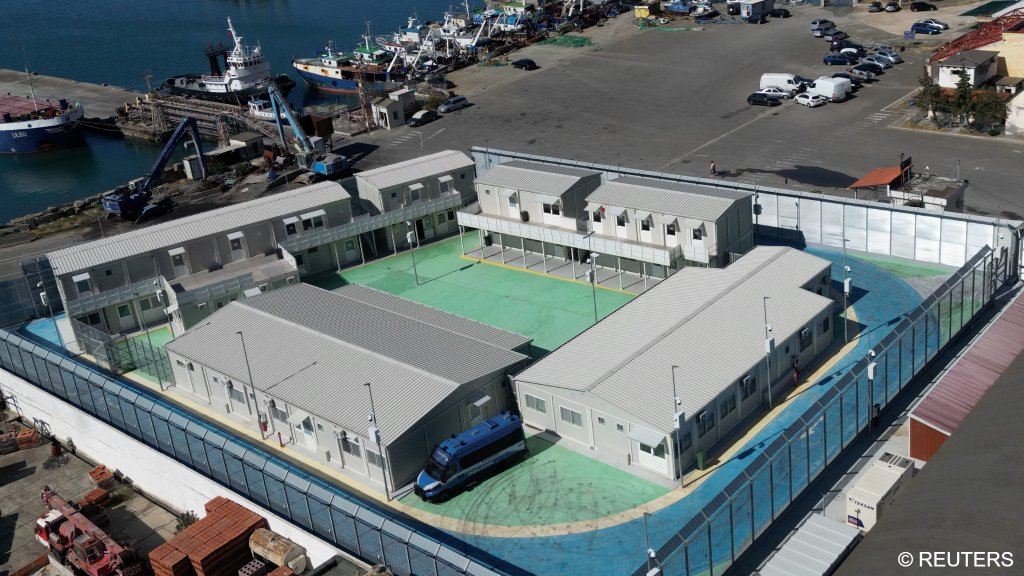The European Court of Justice has questioned the legitimacy of the 'safe countries' list Italy has used to send migrants to Albania to await decisions on their asylum claims. The ruling is another blow to a key aspect of the Italian government's migration policy.
The European Court of Justice (ECJ) on Friday, (August 1), ruled in favor of Italian judges who have blocked the Italian government from sending migrants to detention centers in Albania.
The long-awaited judgment is the latest setback to Giorgia Meloni's and her government's flagship plan to outsource migrant processing to a non-EU country and speed up repatriations of failed asylum seekers. Legal challenges have put the costly scheme on hold for months now.
In a press release, the judges of the highest court of the European Union say that while a non-EU citizen may have their asylum application "rejected under an accelerated border procedure" when the EU member states classify their home country as 'safe', member states "may not include a country in the list of safe countries of origin if that country does not offer adequate protection to its entire population."
In other words: While Italy is free to decide which countries of origin are safe to speed up asylum procedures -- a principle at the heart of the Albania scheme --, it can only do so if a country offers sufficient security for everyone living there, and, crucially, if authorities disclose the sources for their assessment.
The sources on which "such a designation is based must be sufficiently accessible," ensuring that both applicants and courts can access and challenge the supporting evidence, the ECJ judges argued.
This means the ECJ judges effectively agreed with Italian judges that initially raised this issue last year.
In its statement, the ECJ said a court in Italy's capital Rome had referred the matter to EU judges because it couldn't access relevant information, which prevented it from "challenging and evaluating the legality of assuming a country's safety."
Read AlsoItaly: Top court expresses concerns about Italian asylum centers in Albania
Bangladeshis taken to Albania
The specific case that led to Friday's ruling by the ECJ was brought by Italy and involved two Bangladeshi nationals rescued at sea by Italian authorities and taken to Italy's detention center in Albania under the Italy-Albania deal on migration.
There, their asylum claims were rejected based on Italy's assumption that Bangladesh is a safe country as per the list. The Bangladeshis then appealed the decision.

Meloni's right-wing government last year issued a list labelling a number of countries as safe enough for migrants to not be eligible for international protection. The list was meant to sure up the Albania scheme and provide extra justifications for the Italian government's decision to send certain categories of migrants to the centers in Albania.
The Italian court handling the case asked the ECJ to explain if the Italian government was allowed to create a list of safe countries under EU law, if they had to show where they got their information for calling a country safe, and what rules they had to follow in order to do so.
Read Also Italy and Bangladesh strengthen ties on migration and labor cooperation
'Costly, inhumane and inefficient'
Last week, a report found that Italy's Albania centers, currently virtually empty due to the controversy over their legality, are "costly, inhumane and inefficient."
74.2 million euros has already been paid out in contracts for the construction of the repatriation and detention center (CPR) and the smaller processing center at the port of Shengjin.
According to the report authors, this means that the Italian government paid more than 153,000 euros to create one place at the center. By comparison, a center built in 2024 in Porto Empedocle in mainland Italy cost one million euros to create 50 effective places, that is roughly 21,000 euros per place.
Italy slams court ruling
In a statement on the social media platform X, right-wing Prime Minister Giorgia Meloni called Friday's ECJ decision "surprising" and claimed that it serves to "weaken" policies to curb irregular migration and protect "national borders".
Meloni also said the decision further restricted the already limited room for manoeuvre of governments.
Meloni sees the migrant centers in Albania as a key part of her strict immigration policy, which focuses on fast-tracking the vetting of asylum requests and preventing fewer people to enter the country over all. Other European nations, including the UK, are reportedly interested in striking similar deals either with Albania or similar Balkan countries. Albanian leader Edi Rama however has said several times that his deal was signed exclusively with Italy because of the historic friendship between the two countries.
However, the model of using third-countries for repatriation and asylum hubs is being considered as part of the new EU pact on migration and asylum, which is due to be rolled out in 2026.
Read AlsoItalian NGOs call for suspension of Italy-Albania agreement
Legal setbacks
From the outset, the scheme to fast-track the processing of asylum seekers intercepted in the Mediterranean Sea stumbled on legal opposition, with courts ruling in October and November 2024, when the first small contingents docked in Albania that they should be sent back to Italy almost immediately.

The Italian courts ordered the return to Italy of migrants after citing issues with European Union law.
Then, in March of this year, Italy turned the facilities into CPRs, allowing for the repatriation of people who had already been issued with notices to quit and were awaiting deportation in Italy. Even after that decision though, according to the Italian news agency ANSA, since April this year, just 140 people have transited through it and 113 exited.
Citing information from Rome and Lazio's guarantors of the rights of detainees, who visited the facility earlier this week, ANSA reported that 40 of those who had been through the center had exited due to the non-authorization of their detention, 37 due to repatriation, 15 due to their being medically unfit for detention, and seven because of having had their request for international protection granted or for other reasons, such as the transfer to other centers or the suspension of their deportation orders.
Meloni criticized Friday's ECJ decision, saying the courts were getting involved in politics, which she felt is the job of politicians. She also expressed that the ruling put the opinions of individual judges above the decisions of government departments and parliament. She moreover views the timing of the decision as suspicious because it happened a few months before the enactment of the forthcoming EU Migration Pact, which will have stricter rules for dealing with safe countries across the bloc.
The government said that it would seek all possible technical and legal solutions by then "to ensure the safety of citizens," and to ensure that its scheme can function as it originally intended.
with Reuters, dpa
